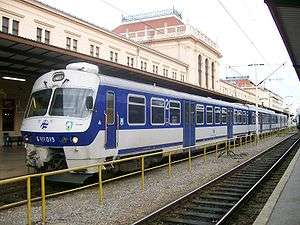Zagreb Commuter Rail
Zagreb Commuter Rail is the suburban/commuter railway network that provides mass-transit service in the city of Zagreb, Croatia and its suburbs. This suburban rail system is operated by Croatian Railways (Croatian: Hrvatske željeznice, HŽ), and has been in development since 1992.
| Overview | |
|---|---|
| Locale | Zagreb, Croatia |
| Transit type | commuter rail rapid transit |
| Number of lines | 1 |
| Number of stations | 19 |
| Operation | |
| Began operation | 1992 |
| Operator(s) | Croatian Railways |
| Technical | |
| System length | 47 km |
| Track gauge | 1435 mm |
| Electrification | 25 kV, 50 Hz AC Overhead lines |


With 21 old trains and 11 new the Suburban Railway mainly covers the eastern and western parts of Zagreb. The railway stations have been renovated and the train services have been made more regular in Zagreb. These measures have contributed to the betterment of the suburban railway service.
Since the system started operating, the lines have been serviced by HŽ series 6111 EMUs built by Ganz. Since 2011, new HŽ series 6112-1 (suburban version) cars were added as well.
In 2005, suburban rail services were increased to approximately 15-minute frequency on the main line Savski Marof – Zagreb Central Station – Dugo Selo.[1]
During rush hours train frequency is 10 min. Since 2010 route was extended for 3 more stations Sutla, Laduć and Harmica.
In planning are more stations between Zagreb Central station and Dugo Selo.
A new link to the nearby town of Samobor has been announced. This link will be standard-gauge and tie in with normal Croatian Railways operations (the previous narrow-gauge line to Samobor was closed in 1979).[2]
References
- Vojković, Ana Marija (1 August 2008). "Zagreb kupuje 18 vlakova za brži prigradski promet". 24 sata (in Croatian). Retrieved 8 December 2008.
- "Uskoro Samoborček i novi prigradski vlakovi" (PDF, 134 KB). Zagrebački komunalni vjesnik (in Croatian) (№ 362): 11. 28 November 2007. ISSN 1845-4968. Retrieved 31 July 2008.
